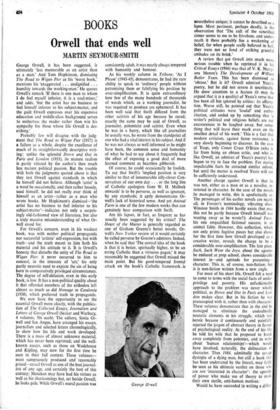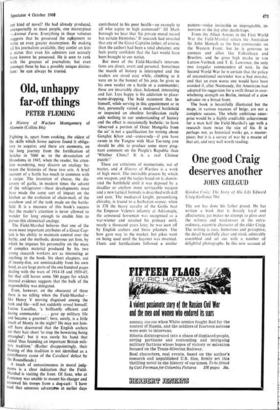Orwell that ends well BOOKS
MARTIN SEYMOUR-SMITH
George Orwell, it has been suggested, is ultimately 'less memorable as an artist than as a man.' And Tom Hopkinson, dismissing The Road to Wigan Pier as his 'worst book,' mentions his 'exaggerated . . . undignified . . . humility towards the working-man.' He quotes Orwell's remark 'If there is one man to whom I do feel myself inferior, it is a coal-miner,' and adds, 'but the artist has no business to feel himself inferior to his subject-matter, and the guilt Orwell expresses over his expensive education and middle-class background serves to embarrass the reader rather than win his sympathy for those whose life Orwell is des- cribing.'
Probably few will disagree with the judg- ment that The Road to Wigan Pier (1937) is a failure as a whole, despite the excellence of much of its straightforwardly descriptive writ- ing: unlike the splendid Down and Out in Paris and London (1933), its mature realism is partly vitiated by the author's then much less mature political passion. But the trouble with both the judgments quoted above is that they test Orwell against standards in which he himself did not believe. Although 'artist' is a word he occasionally, and then rather loosely, used himself, he did not really ever think of himself as an artist—rather as a man who wrote books. Mr Hopkinson's dismissal—`the artist has no business to feel inferior to his subject-matter'—indicates not only a surpris- ingly old-fashioned view of literature, but also a truly massive misunderstanding of what Or- well stood for.
For Orwell's concern, even in his weakest book, was with neither political propaganda nor successful 'artistic' self-expression, but with truth—and the truth meant to him both his material and his attitude to it. It is Orwell's honesty that disturbs the unity of The Road to Wigan Pier: it never occurred to him to conceal, in the interests of 'art,' his only partly neurotic need to expiate the sin of being born in comparatively privileged circumstances. The degree of self-delusion, even in this early book, is low. It has a non-political quality about it that offended members of the orthodox left almost as much as did Homage to Catalonia (1938), which preferred truth to propaganda.
We now have the opportunity to see the essential Orwell more clearly, with the publica- tion of The Collected Essays, Journalism and Letters of George Orwell (Secker and Warburg, 4 volumes, 50s each). The editors, Sonia Or- well and Ian Angus, have arranged his essays, journalism and selected letters chronologically, to show how his life and work developed. There is a mass of almost unknown material, which has never been reprinted; and the well- known essays, such as those on Wodehouse and Kipling, may now for the first time be seen in their full context. These volumes— most sumptuously produced and reasonably priced—reveal Orwell as one of the best journal- ists of any age, and certainly the best of this century; Mencken may have had his virtues as well as his shortcomings but, set beside Orwell, be looks pale. While Orwell's moral passion was consistently adult, it was nearly always tempered with humanity and humour.
As his weekly column in Tribune, 'As I Please' (1943-45), demonstrates, he had the rare ability to speak to 'ordinary' people without patronising them or falsifying his position by over-simplification. It is quite extraordinary how few of the many hundreds of thousands of words which, as a working journalist, he was required to produce are ephemeral. It has been well said that Swift differed from the other satirists of his age because he cared; exactly the same may be said of Orwell, as journalist, polemicist and satirist. Even when he was in a hurry, which like all journalists he usually was, he wrote from the standpoint of one who had a vital interest in his subject. And if he was not always as well informed as he might have been, the common sense and humanity of what he had to say about it frequently had the effect of exposing a good deal of more learned comment as heartless gibberish.
Of course, he could occasionally be foolish. To say that Swift's 'implied position is very similar to that of innumerable silly-clever Con- servatives of our own day . . . or the long line of Catholic apologists from W. H. Mallock onwards' is to be perverse, as well as ignorant, by any standards; it aptly demonstrates Or- well's lack of historical sense. And yet Animal Farm is one of the few modern works that can genuinely bear comparison with Swift.
Are his lapses, in fact, as frequent as has usually been suggested by his critics? The Heart of the Matter is generally regarded as one of Graham Greene's better novels; Or- well's New Yorker review of it would certainly be called perverse by Greene's admirers. Indeed, when he said that 'The central idea of the book is that it is better, spiritually higher, to be an erring Catholic than a virtuous pagan,' it may reasonably be suggested that Orwell missed the main point. But his good-tempered frontal attack on the book's Catholic framework. is George Orwell nevertheless unique; it cannot be described as a lapse. Most pertinent, perhaps deadly, is the observation that The cult of the sanctified sinner seems to me to be frivolous, and under- neath it there probably lies a weakening of belief, for when people really believed in hell, they were not so fond of striking graceful attitudes on its brink.'
A review that got Orwell into much more serious trouble when he reprinted it in his Critical Essays (1946) was that of V. K. Naray. ana Menon's The Development of William Butler Yeats. This has been dismissed as 'obtuse.' But is it? Orwell admired Yeats's poetry, but he did not revere it uncritically. He drew attention to a feature (it may be argued that it is a quality) of Yeats's verse that has been all but ignored by critics: its affecta- tion. Worse still, he pointed out that Yeats's political attitudes were 'feudal' and autho- ritarian, and ended up by remarking that 'a writer's political and religious beliefs are not excrescences to be laughed away, but some- thing that will leave their mark even on the smallest detail of his work.' This is a fact that modern criticism, against fierce resistance, is very slowly beginning. to discover. In the case of Yeats, only Conor Cruse O'Brien (who is far from being an obtuse critic, and who is, like Orwell, an admirer. of Yeats's poetry) has begun to try to face the problem. For stating unpalatable facts he attracted similar odium; but until the matter is resolved Yeats will not be sufficiently understood.
Another charge against Orwell is that he was not, either as a man or as a novelist, in- terested in character. In the case of the novels he managed to write, this is apodictically so. The personages of his earlier novels are nearly all, in Forster's terminology, vibrating discs. Winston Smith in 1984 hardly' exists (but may this not be partly because Orwell himself was wasting away as he wrote?); Animal Farrar. his one unqualified fictional success, is an animal fable. However, this collection, which not only prints fugitive pieces but also shows for the first time how Orwell developed as a creative writer, reveals the charge to be a considerable over-simplification. The late piece, Such, Such Were the Joys, about the agonies he endured at prep school, shows considerable interest in—and aptitude for presenting— character. This is, of course, non-fiction; but it is non-fiction written from a new angle.
For most of his short life, Orwell felt a need to come to terms with the social facts of under- privilege and poverty. His unfashionable approach to the problem was never wholly political, as Down and Out in Paris and Lon- don makes clear. But in his fiction he was preoccupied with it, rather than with character. These volumes demonstrate that in the end be managed to eliminate the undoubtedly neurotic elements in his struggle, which was heroic because it continuously and painfully rejected the jargon of abstract theory in favour of psychological reality. At the end of his life he told his wife that he proposed to break away completely from polemics, and to write about 'human relationships'—which would have involved, naturally, the delineation of character. Thus 1984, admittedly the savage dystopia of a dying man, but still a book that has been underrated by the literati, may fairly be"seen as his ultimate verdict on those who are not 'interested in character': the apostles of power who make use of theory to mask' their own sterile, anti-human motives.
Would he have succeeded in writing a 'differ' eat kind of novel? He had already produced, unexpectedly to most people, one masterpiece —Animal Farm. Everything in these volumes suggests that he possessed the eqUipment to write an even greater masterpiece. By making all his journalism available, they confer on him a status that even his admirers can scarcely have known he possessed. He is seen to rank with the greatest of journalists; but even amongst these he has a possibly unique distinc- tion: he can always be trusted.







































 Previous page
Previous page